Iranian hardliners consolidated their grip on power in the March 1 election for Parliament and the Assembly of Experts. The 290 seats of Parliament are elected every four years. Elected every eight years, the 88-member assembly has been charged with selecting and overseeing the supreme leader.
Many of the winning candidates were members of the Paydari (Steadfastness) Front, which “favors a state-controlled economy and proclaims to be committed to social justice, especially rooting out corruption and making government more efficient,” Hadi Semati, a former Tehran University professor, told The Iran Primer in 2023. “They are more hawkish on foreign policy and want Iran to grow closer to non-Western powers, namely China and Russia.” Also, known as "principlists," they have applied rigid revolutionary principles.
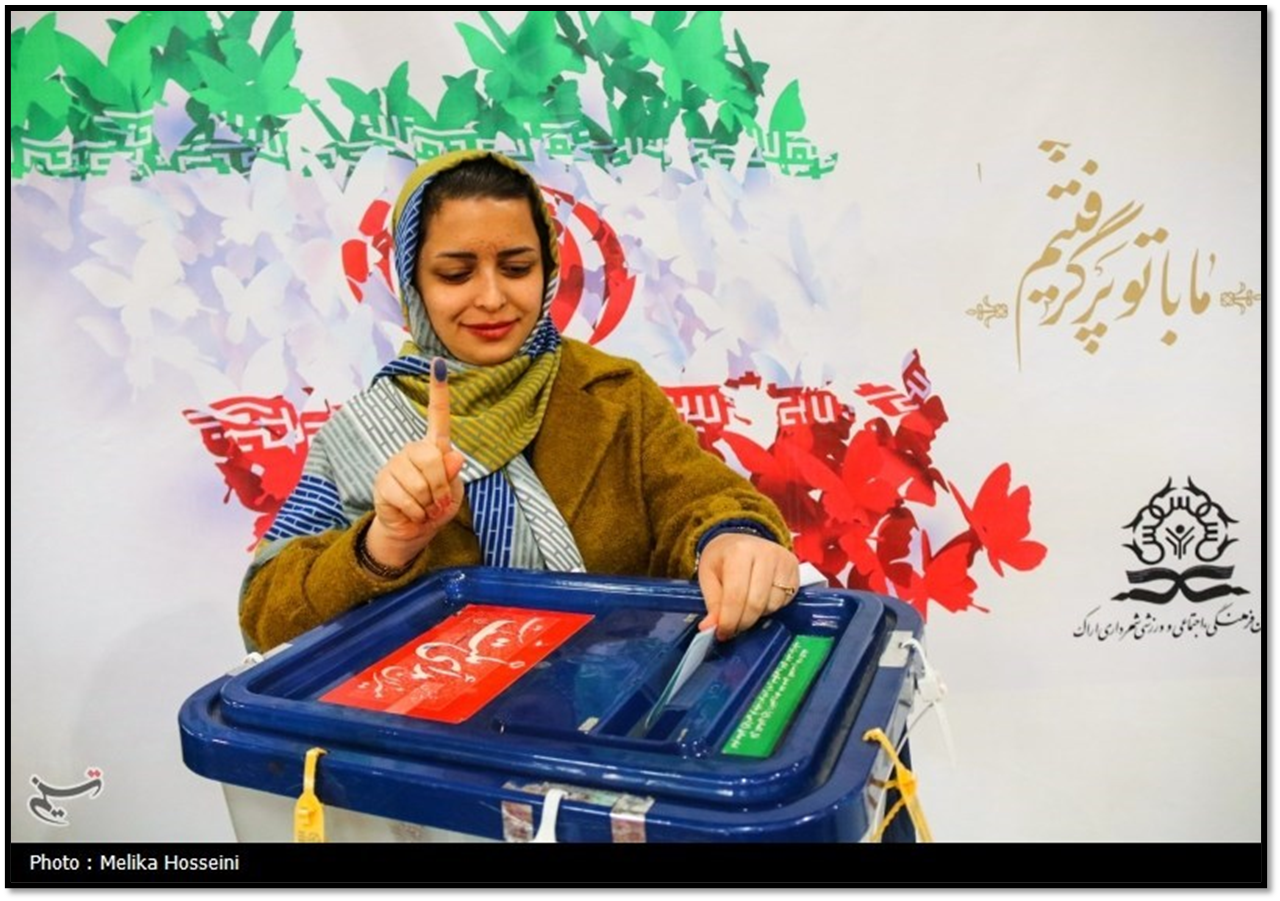
Only 25 million out of 61 million eligible voters cast ballots despite intense government appeals. The turnout was 41 percent, the lowest since the 1979 revolution. Only 24 percent turned out in the capital Tehran, according to unofficial results reported by local outlets.
The figures reflected widespread dissatisfaction with the government, especially since the bloody crackdown on nationwide protests sparked by the death of Mahsa Amini – the young woman arrested by the morality police for an improper head covering – in police custody in September 2022.
Iranian officials downplayed the low turnout. “We witnessed a very good and extensive competition,” Interior Minister Vahidi told reporters. Vahidi claimed that Iran’s enemies had failed to discourage voters with “propaganda” and “psychological operations.”
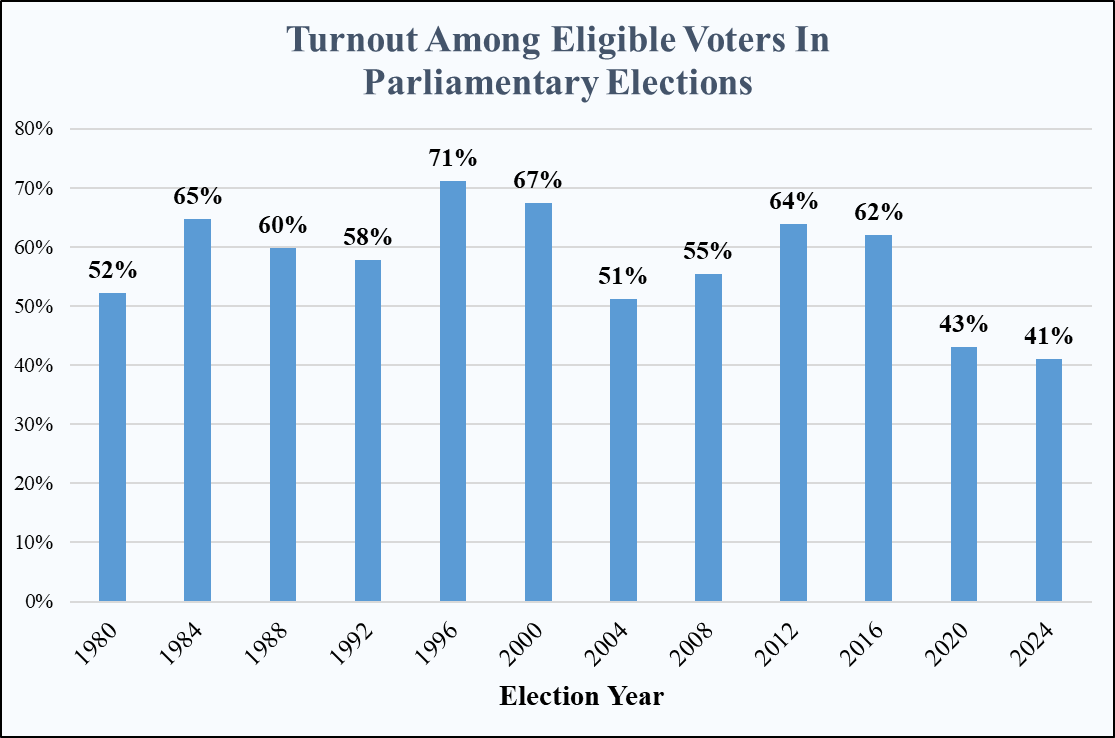
Results: Parliament
In the first round of voting, Iranians decided 245 out of 290 seats. A runoff will be scheduled for April or May to decide the remaining 45 seats. The winners of the first round included:
- At least 138 hardliners or conservatives
- 48 independents
- 25 reformists
- 11 women
In the voting, hardliners had two major advantages. First, the powerful Guardian Council had narrowed the field by barring nearly all prominent reformists and centrists from both races. Second, many reformists and political activists boycotted the vote.
Mohammad Baqer Qalibaf, the parliamentary speaker between 2020 and 2024, performed poorly compared to the last election. In 2020, he received 1.26 million votes, more than any other candidate for the 30 seats allocated to Tehran. But in 2024, he came in fourth place with just 447,905 votes. Qalibaf, a mainstream or traditional conservative, trailed hardline candidates from the Paydari Front – Seyyed Mahmoud Nabavian with 597,770 votes, Amir Hossein Sabeti with 487,982 votes, and Hamid Rasayei with 485,711 votes.
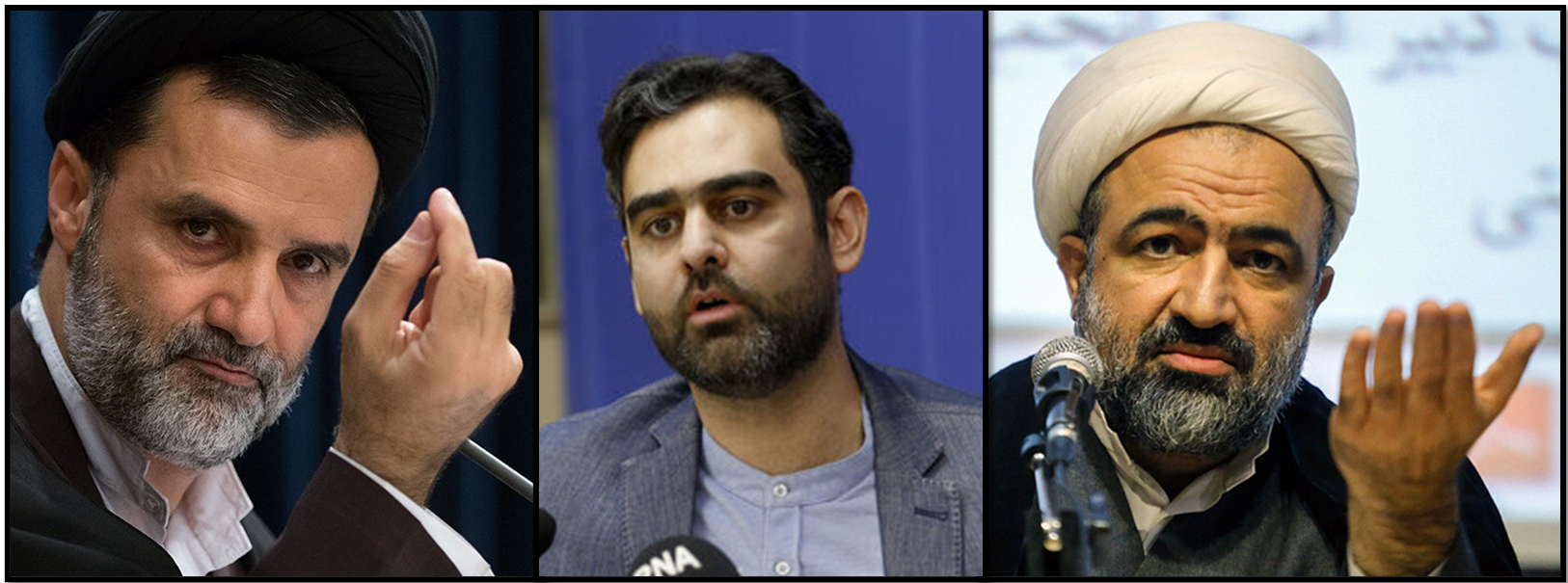
The results reflected a “resurgence of principlists and marginalization of traditional conservatives,” Sina Azodi, a lecturer at George Washington University, told The Iran Primer. He also noted the rise of a new generation of principlists, including Sabeti, who came in second place in Tehran.
Born in 1988, Sabeti gained notoriety as a conservative TV commentator and a vocal critic of the 2015 nuclear deal between Iran and the world’s six major powers. In 2023, he was recruited by the prestigious Sharif University of Technology amid a widespread purge of academics critical of the government.
Hardliners made further gains in run-off elections on May 10. In total, 233 out of 290 seats went to hardliners, according to the Associated Press. In Tehran, candidates competed for 16 out of 30 seats. The turnout was only eight percent, down from 24 percent the last time the capital held a second-round vote in 2012.
Results: Assembly of Experts
Hardliners also dominated the Assembly of Experts election. It will select a successor to Khamenei, who is 84, should he die or become unable to fulfill his duties in the next eight years. The outgoing chairman, Ahmad Jannati, turned 97 in February 2024 and did not seek reelection. Of the 88 clerics and scholars, 53 were incumbents. The two candidates who received the most votes were Ayatollah Alireza Arafi and Ayatollah Mohsen Qomi, who both have had close ties to Supreme Leader Khamenei.
The Guardian Council, which vets all candidates, disqualified prominent centrists and reformers in 2024. The assembly “has been purged of the most centrist representatives of reason,” Kourosh Ziabari, an Iranian journalist at Columbia University, told The Iran Primer. The Guardian Council notably barred former President Rouhani, even though he had served on the body for 17 years. It also rejected former Intelligence Minister Mahmoud Alavi, former head of IRGC Intelligence Hossein Taeb, and former Intelligence Minister Heydar Moslehi.
Iran’s deep state “is bracing for the succession and is not taking any chances by shutting down all formal venues of expressing dissent,” Azodi added. The deep state includes the powerful Revolutionary Guards, the Guardian Council, the Assembly of Experts, and the Office of the Supreme Leader.
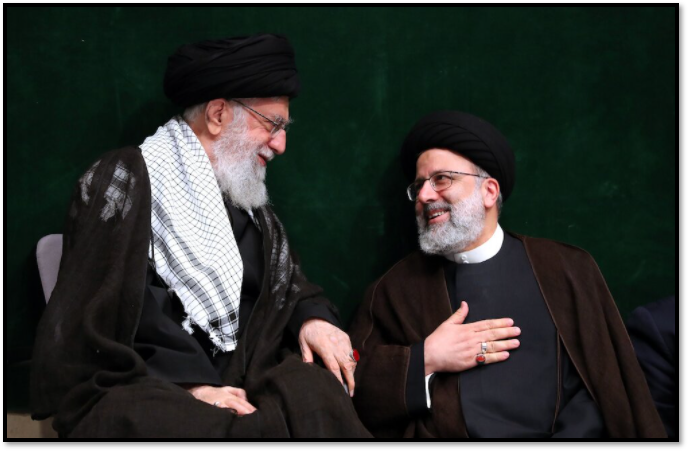
Many of the candidates for the assembly did not have national name recognition. One exception was President Ebrahim Raisi, a hardliner who has served on the assembly since 2007, was the main one to watch, according to Azodi. Raisi and Mojtaba Khamenei, the supreme leader’s second son, are widely considered to be top contenders for the next supreme leader.
Turnout and Boycotts
Supreme Leader Ayatollah Ali Khamenei encouraged the public to vote in a brief televised address after casting his ballot. “Today many people around the world, including people in general, politicians, and holders of important national and political positions, are watching Iran,” he said. “Pay attention to this [and act in a manner that] will make our friends happy and ill-wishers disappointed.”
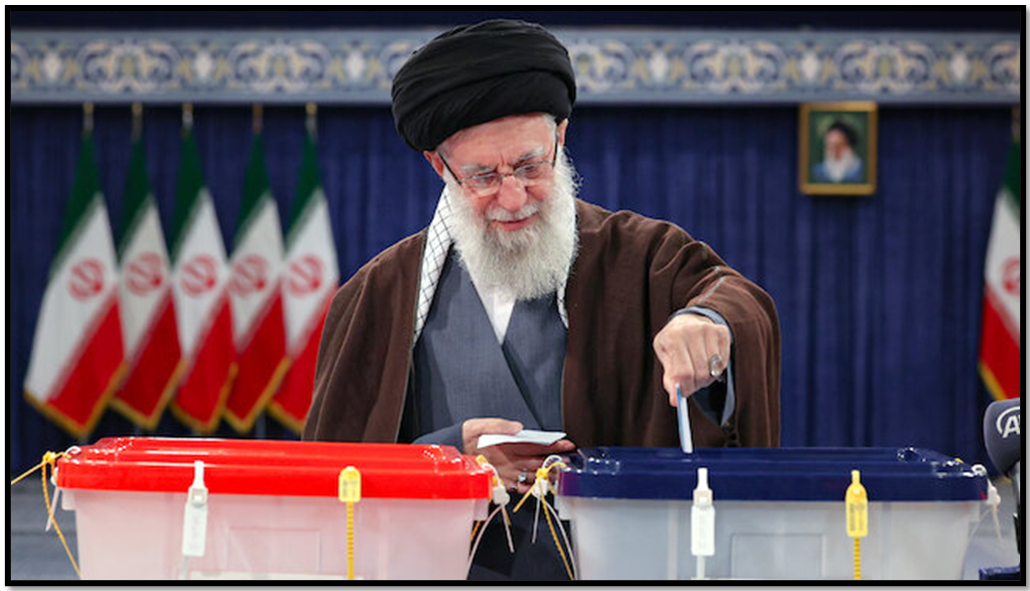
The government, which cites turnout as a reflection of public support, urged participation by:
- Keeping polls open for an extra six hours on election day
- Intimidating teachers to vote
- Giving soldiers four days of leave
- Threatening prisoners with consequences for boycotting
- Allowing voting with any one of five different identity documents
But several prominent individuals and organizations had called for a boycott:
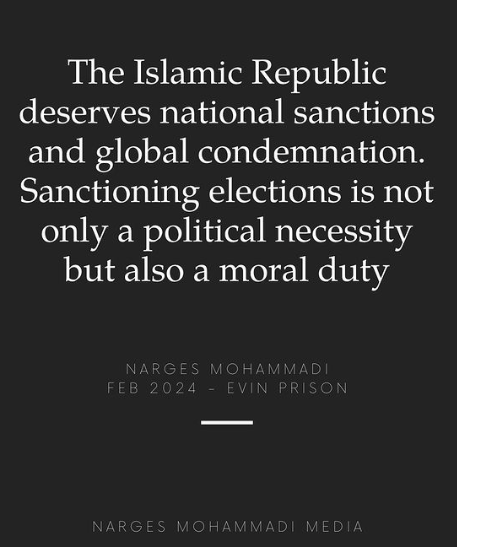
- Faezeh Hashemi, former member of Parliament, daughter of former President Akbar Hashemi Rafsanjani, and a political prisoner
- Narges Mohammadi, a political prisoner, human rights activist and 2023 Nobel Peace Prize winner
- The Reformist Front, an umbrella of political parties and organizations
- Mostafa Tajzadeh, a former acting interior minister and advisor to former President Mohammad Khatami, and a political prisoner
- A group of 300 activists and politicians, including former members of Parliament and a former mayor of Tehran
- Saeed Madani, a sociologist and a political prisoner
- Hossein Razzaq, a media activist and a political prisoner
- The National Front of Iran, a secular and pro-democracy party
- Abolfazl Qadiani, a former political prisoner and founder of the Hamujahadin (Fighters) of the Islamic Revolution organization
- Toomaj Salehi, a rapper and a political prisoner
For the first time, former President Mohammad Khatami (1997-2005), who is widely considered the de facto leader of the reformist movement, abstained from voting. He had criticized the electoral process but had not explicitly called for a boycott.
The 2024 turnout was even lower than the last two elections. In 2021, turnout for the presidential election was only 49 percent, the lowest since the 1979 revolution. And turnout for the 2020 parliamentary election was just under 43 percent. Parliament’s legislative portfolio complements the broader pattern of “micromanagement and manipulation of life, public spaces, culture, media, and education while ensuring the continued impregnability of the theocracy,” Ziabari told The Iran Primer. “This structure doesn't appeal to people, and it shouldn’t be expected of middle-class, young, urban Iranians to turn up at the polling stations and validate such an asymmetric, anachronistic process.”
Iran had higher turnouts for years. Many Iranians believed that they could bring change through the ballot box, Azodi, told The Iran Primer. The turnouts for the 2013 and 2017 presidential elections were 73 percent. In both polls, voters selected Hassan Rouhani, who ran a platform of moderation in both domestic and foreign policy. But he failed to implement significant or lasting reforms, which disillusioned voters. The barring of reformist and centrist candidates by the Guardian Council in the 2020 parliamentary election and the 2021 presidential election further eroded public confidence.
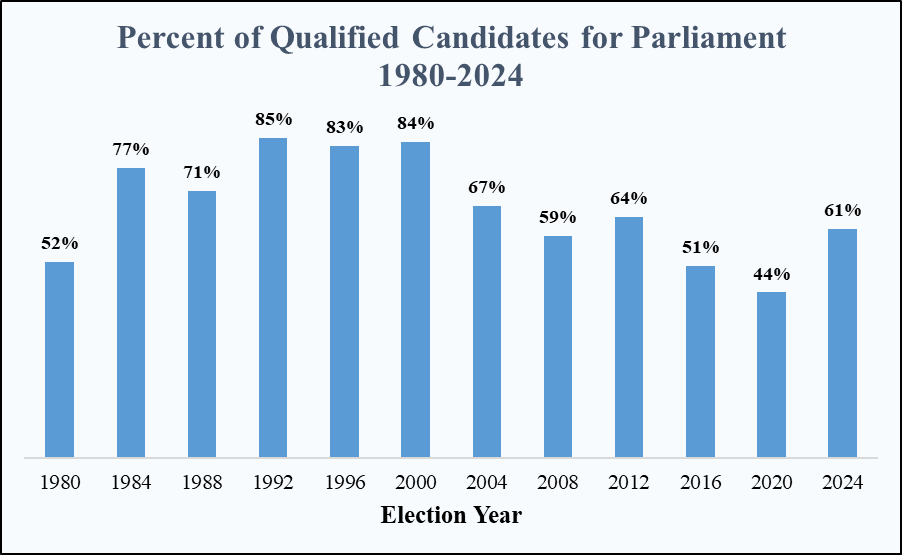
U.S. Reaction
The United States criticized the Islamic Republic on election day amid deepening tensions in the Middle East. “The regime seeks to use these elections as the façade of democracy, but has already disqualified thousands of candidates,” Abram Paley, the U.S. Deputy Special Envoy for Iran, wrote on X (formerly known as Twitter). “The Iranian people know well these elections are unrepresentative, whatever the outcome. And we do too.” Paley also pledged that the U.S. government stood with Iranians “in their fight for a free and democratic future.”
Iran’s foreign ministry shot back at Washington. “The United States is not in a position to take a stance on and interfere in the elections in Iran,” Nasser Kanaani, a spokesperson, said. “If U.S government officials are concerned about democracies and votes of nations, they should first find a fix for their own country and election system’s health in America itself as we are seeing strange stories in every U.S election.”
